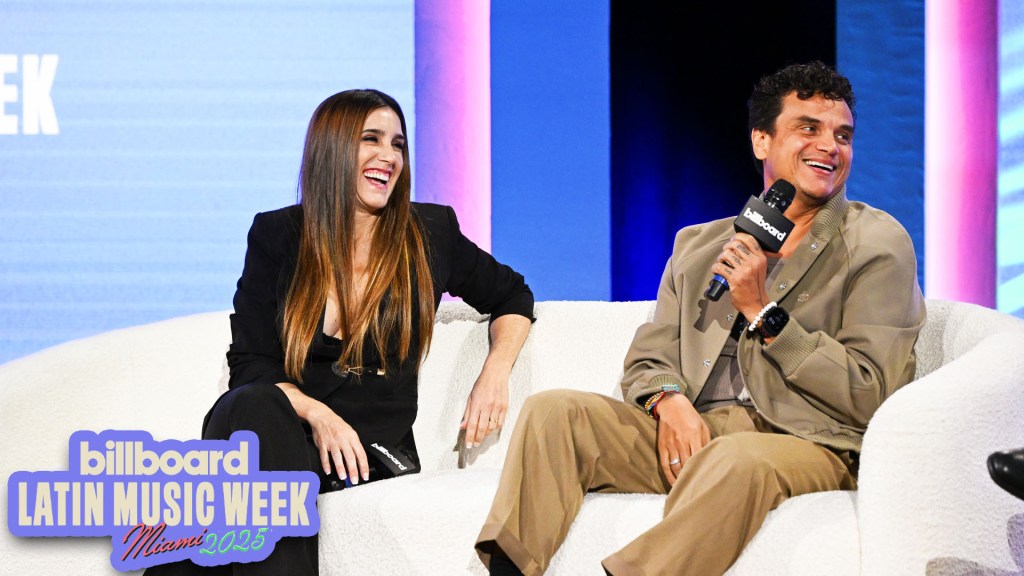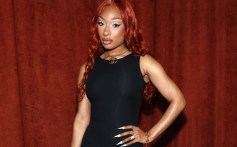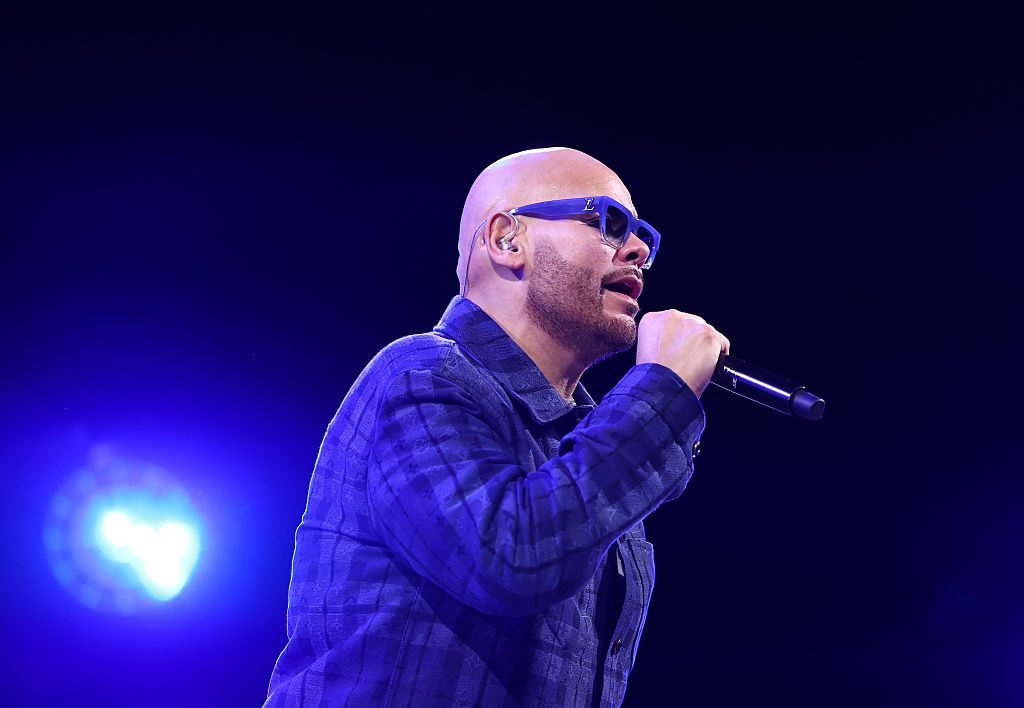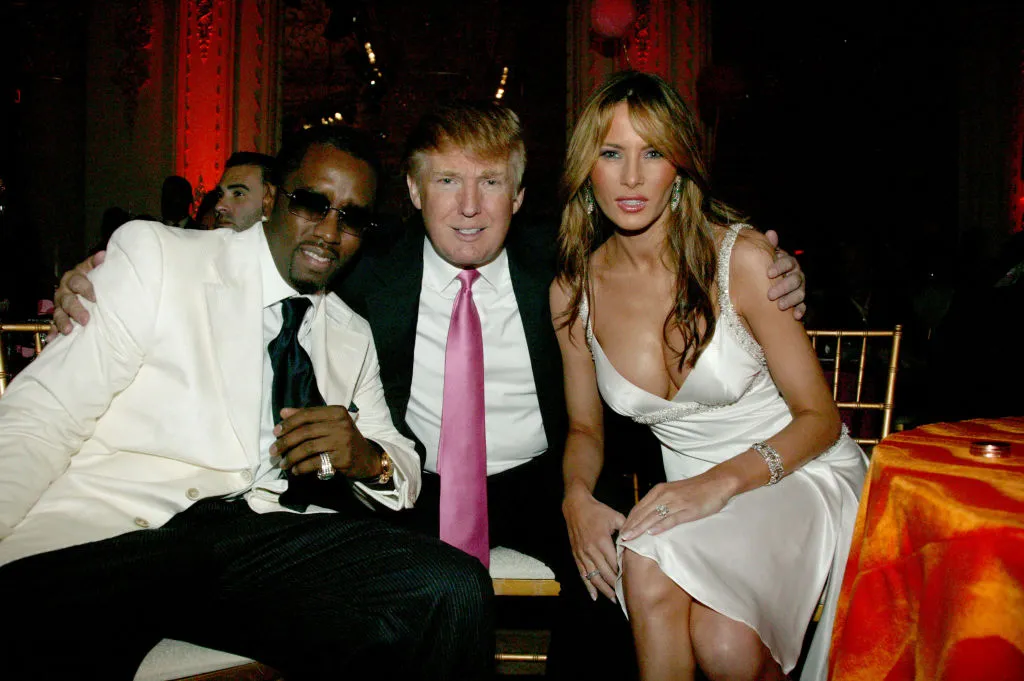News
Page: 223
Trending on Billboard
Danny Ocean sat down with Billboard’s Leila Cobo at Billboard Latin Music Week 2025 for “The Sony Music Publishing Iconic Songwriter Q&A” panel to discuss how he’s crafted his biggest hits, including “Me Rehuso,” and the power of his songs to transform society.
Presented by Sony Music Publishing, the Venezuelan singer-songwriter — whose artistic name is a nod to George Clooney’s character in the Ocean‘s trilogy — spoke candidly about looking inward and trusting his intuition when crafting songs. It’s what was key for “Me Rehuso” (“I Refuse”), Danny’s breakout hit, a love song he wrote for a girlfriend as a Valentine’s Day gift that also captures his migration journey from Venezuela to Miami.
“I had no way of getting something to my girlfriend back in Venezuela, so I wrote her a song — not knowing when I would see her again,” Danny said. “I didn’t overthink things, it was what I was living at the moment. ‘Me Rehuso’ was also a feeling of having to leave Venezuela.”
The track was released while he was working at a pizzeria in Kendall, Fla., but he eventually doubled-down on songwriting, taking inspiration from personal relationships, including the one with his beloved Venezuela.
“Having to migrate had a huge impact on my life and made me question things, such as how we can make Venezuela have that outlet like other countries,” he explained. “I see Venezuela as my partner, [my songs] are a direct, personal conversation with Venezuela. But I also don’t want to romanticize it, it’s my relationship with Venezuela, and everyone has their own relationship with their own country. I don’t see it as a manifesto or something political.”
Have you played Billboard’s Latin Music Week Crossword?Play now!
For “Caracas en el 2000,” Danny collaborated with fellow Venezuelans Elena Rose and Jerry Di. “Putting Venezuela on the radar started out as something very personal between us,” he said. “We’d go out for a beer, talk about how we were feeling, and those conversations would end up in the studio, then in a song. It’s been very natural.”
When asked by an audience member what he’d do when he returns to Venezuela, Danny Ocean said, “Everything I didn’t do when I was there, and hang out with people, find out what they think, what they’re up to. I want to spend some time at home, hang out with my family, connect with the streets. And visit Los Roques, I’ve never been.”
Spanning more than 30 years, Latin Music Week is the single-most important and largest gathering of Latin artists and industry executives in the world. This year’s event once again hosts panels, marquee conversations, roundtables, networking and activations, in addition to its celebrated Billboard En Vivo showcases.
This year’s star-studded lineup includes Aitana, Alofoke, Anuel AA, Bebeshito, Carlos Vives, Carín León, Danny Ocean, DJ Khaled, Daddy Yankee (DY), Emilia Mernes, Ivy Queen, Gloria Estefan, Grupo 5, Kapo, Laura Pausini, Luck Ra, Netón Vega, Olga Tañón, Óscar Maydon, Ozuna, Pablo Alborán, Rawayana, Suzette Quintanilla, Tokischa, Xavi and Yailin La Más Viral, to name a few.
Latin Music Week also coincides with the 2025 Billboard Latin Music Awards, set to air Thursday, Oct. 23, on Telemundo and Peacock, where Bad Bunny will be honored as Top Latin Artist of the 21st Century.

Trending on Billboard Argentina and Colombia meet in a conversation between Silvestre Dangond & Soledad who have been on stage for decades as they discuss embracing their respective folklore as a creative base, a bridge between generations, and a driving force of today’s music presented by Billboard Argentina and Billboard Colombia.

Trending on Billboard
Ed Sheeran is used to playing for tens of thousands of rabid fans in stadiums around the world. But how does his emotional music play in a New York classroom of third graders? Check out the latest episode of the heart-warming series Celebrity Substitute, in which Sheeran pops into PS20 in Brooklyn to teach students how to transform everyday sounds into fully fledged songs.
Explore
See latest videos, charts and news
Host Julian Shapiro-Barnum sits down with Sheeran in the Clinton Hills classroom’s small chairs to observe as the singer teaches his young charges about rhythm and sound using his trusty loop rig, even as Ed laments that perhaps he’s “not the best substitute teacher.” Or, he offers, maybe he is just that because, he recalled (before the students arrived), sometimes when a sub comes in you feel like, “‘f–k, you’re not my real teacher… don’t tell me what to do!’”
Well aware that he doesn’t command authority and is basically a big Pokemon-loving adult kid himself, Sheeran recalled the nasty names he got called in school, helping to prove Shapiro-Barnum’s credo that “weirdos make the coolest adults.” (See the full video below.)
After getting affixed with his official “Mr. Ed” sub name tag — and getting warned by teachers Mr. Chung and Mr. Hampton that his lesson plan was “ambitious” at best — Sheeran dug into his curriculum of teaching the importance of rhythm, finding your own sound and, most importantly, rehearsing.
Sheeran got right to work, playing his 2015 Billboard Hot 100 No. 15 hit “Photograph,” which was met with mixed reviews from kids who were fans, some who were not so much, and one girl who recalled seeing him in a book about Taylor Swift once, but having no idea why he was in it. “I like the music… a lot,” said one young man named Theo, who admitted that he wasn’t familiar with Sheeran’s ouvre, but does love soccer and had a friend who was the fastest player on his team before he moved to England.
After teaching the kids the basics of the waltz and 4/4 rhythms by noting that pal Swift’s “Style” is in 4/4 by clapping his hands in time, Sheeran set about making sure the kids were picking up what he was laying down by asking them to clap their hands and stomp their feet at the same time in rhythm.
One-by-one the students came up to the mic to say silly phrases that Sheeran looped together to form a rhythm, earning praise from the teachers for his pedagogical skills. Busting out a box of instruments that turned the room into a riot of noise, Sheeran then encourage each student to share their unique sound into the mic, from saxophone bleats to fart sounds.
The 15-minute clip ends with a command Show & Tell performance of “The PS20 Kids and the Morning Routine” original song about brushing your teeth which is guaranteed to be the cutest thing you see all day.
Watch Sheeran on Celebrity Substitute below.
Trending on Billboard
Lizzo is facing a copyright lawsuit over her “I’m Going Til October,” a track she teased on social media to poke fun at Sydney Sweeney’s American Eagle ad controversy but never actually commercially released.
The case, filed Tuesday by a group called GRC Trust, claims that Lizzo’s provocative song (also known as “Good Jeans” in reference to the Sweeney debacle) stole material from an earlier track called “Win or Lose (We Tried),” which appears to have been recorded by the soul singer Sam Dees.
Related
Obtained by Billboard, the lawsuit is light on details – claiming Lizzo’s track “incorporates, interpolates, and samples instrumental and vocal elements” without more specifics. But it pointedly says that reps for the star have “acknowledged” that the materials were used.
The case is notable because Lizzo never formally released the song in question. Though she teased a snippet on TikTok, the star has not included it on any formal release, including her June mixtape My Face Hurts From Smiling. Her long-awaited next studio album, Love in Real Life, was scheduled to drop at some point in 2025 but she said last month she’s unsure if or when it will be released.
Posting a song featuring an uncleared sample on social media would still count as copyright infringement; but the stakes would be lower, because it would be harder to prove that Lizzo made substantial profits without actually selling the allegedly infringing song. Such pre-release disputes are more typically handled with private negotiations rather than full-blown lawsuits.
In a statement to Billboard, Lizzo’s reps said: “We are surprised that The GRC Trust filed this lawsuit. To be clear, the song has never been commercially released or monetized, and no decision has been made at this time regarding any future commercial release of the song.”
Related
The American Eagle ads, launched in July under the tagline “Sydney Sweeney Has Great Jeans,” sparked criticism that they were an allusion to eugenics and white supremacist ideals. That then prompted a right-wing backlash defending them and mocking the critiques.
In her August video on TikTok, Lizzo can be seen washing a Porsche while wearing a denim top. The clip features a snippet from “Going Til October,” in which the star raps: “No kizzy, he ain’t got no business being with me. Fat ass pretty face with the titties. Bitch, I got good jeans like I’m Sydney.”
While Tuesday’s lawsuit claims that snippet used material from “Win or Lose,” it doesn’t explicitly specify who wrote or recorded that track. But it appears to be the 1995 song recorded by Dees, which repeatedly features the lyric “win or lose we tried.” In an earlier sampling suit against Ye (formerly Kanye West), GRC Trust brought similar infringement allegations over another track by Dees.
The copyright case is the latest legal headache for Lizzo. In 2023, she was hit with a bombshell lawsuit from three former dancers (Arianna Davis, Crystal Williams and Noelle Rodriguez) who claimed they had experienced sexual harassment and a hostile work environment while working for the superstar. The case, which also included allegations of weight-shaming, racial and religious discrimination, remains pending amid a lengthy appeal.
Earlier this summer, attorney Tyrone Blackburn, who is representing a man suing Fat Joe for unpaid royalties related to ghostwriting duties, was arrested for assaulting a process server in New York City. Now, the lawbreaking lawyer is facing the full force of the law related to the incident.
According to TMZ, Blackburn was officially indicted for allegedly running over a process server with his car this past May while he was attempting to serve Blackburn with papers related to his lawsuit against Fat Joe. Jumping in his car during the attempt, Blackburn allegedly jumped in his car and reversed into the 66-year-old process server, causing him extensive leg damage that apparently required surgery to repair.
While we don’t know what effect this will have on Blackburn’s case against Fat Joe, it certainly seems like he had no interest in receiving whatever papers said server was trying to get to him related to the case and now he’ll have to answer for his transgression in a court of law.
TMZ reports:
Blackburn represents Terrance “T.A.” Dixon, who sued Fat Joe for millions, alleging he helped Joe write music. Later on, Dixon and Blackburn filed another lawsuit accusing Joe of engaging in sexual relations with minors in a lawsuit Joe’s attorney Joe Tacopina said was full of “lies intended to damage his reputation and force a settlement through public pressure.”
Tyrone was booked on assault about six weeks after the alleged incident is said to have taken place.
Naturally, Fat Joe is denying all of these allegations as he prepares to fight this case to the bitter end, but the question remains whether Dixon will remain on the case now that he has his own legal problems to deal with.
What do you think about this situation? Let us know in the comments section below.
—
Photo: Getty
Sean “Diddy” Combs was recently sentenced in his prostitution case and was hit with 50 months, which equates to four years and two months. Sources close to Diddy informed TMZ that President Donald Trump is considering commuting Diddy’s sentence, a claim the White House denies, but the outlet stood firmly by its earlier report in an update.
TMZ first reported Monday night (October 20) that a high-ranking White House official revealed to them that Trump mulled over commuting Combs’ sentence this week. Some of Trump’s aides are pushing for him not to commute the sentence, but conceded that the president “will do what he wants” in regards to the matter.
The White House Communications Office refuted TMZ’s report, prompting the outlet to immediately issue an update to its story.
From TMZ:
The White House Communications Office is saying our story is not true. We stand by our story. Our story is accurate.
So far, Diddy has been jailed for 13 months, and that time served could reduce his sentence to just two years. A commutation is not a pardon, just a reduction in sentencing.
—
Photo: Getty

Trending on Billboard
Shakira is ready for Bad Bunny to headline the 2026 Super Bowl Halftime Show — but she says the Puerto Rican superstar should have been tapped for the gig a long time ago.
When asked about the news that Benito will perform at the big game in February during a Variety interview published Tuesday (Oct. 21), Shakira replied, “It’s about time!”
“I’m so proud that Bad Bunny, who represents not only Latin culture, but also how important Spanish language music has become on a global scale and how universal it has become, is getting to perform on the biggest stage in the world,” she continued. “It’s the perfect moment for a performance like this. I can’t wait to watch it.”
Benito previously performed on the Super Bowl stage as a guest artist alongside joint headliners Shakira and Jennifer Lopez. They performed part of their set in Spanish, which Shak told the publication was a “bold move” at the time.
“Acceptance of Spanish-language music as part of the mainstream has come so far from when I started,” she added. “I hope and like to think that all the times my music was met with resistance or puzzlement from the English-speaking world before it was embraced, helped forge the path to where we are now.”
It’s true that millions of fans are excited to see Bad Bunny perform at Levi’s Stadium in Santa Clara, Calif., next year, but his appointment as Super Bowl Halftime Show headliner has also received backlash — primarily from political conservatives, who take issue with the fact that the singer-rapper’s music is all in Spanish. President Donald Trump called the choice “absolutely ridiculous,” White House advisor Corey Lewandowski claimed Benito “hates America” — despite the fact that the musician is an American citizen — and Turning Point USA announced plans to host an alternate, MAGA-approved halftime program.
But, as Billboard‘s chief content officer of Latin/Español Leila Cabo pointed out, there is nothing inherently political about the selection of Bad Bunny for halftime. “As those of us who speak Spanish daily can attest, many still look down on Spanish as a language, and definitely on the people who speak it,” she wrote in a recent op-ed. “Let’s acknowledge that having Bad Bunny headline the Super Bowl is a bold choice — but let’s also be real about the reasons.”
Shakira’s latest interview comes amid her 30th anniversary celebrations of her album Pies Descalzos, as well as the 20th anniversary of Oral Fixation, Vol. 1. Elsewhere in her conversation with Variety, she shared which Gen-Z star she’d love to collaborate with on a reimagined version of one of her Oral Fixation tracks.
“I would love to hear Chappell Roan on ‘La Pared,’” she said. “I think she would do an incredible rendition. Her voice and her artistry are incredible.”
Billboard’s Live Music Summit will be held in Los Angeles on Nov. 3. For tickets and more information, visit the event’s website.
Trending on Billboard
Tex-Mex combo Grupo Frontera has entered into a worldwide distribution agreement with The Orchard, the Sony-owned music distribution company, covering both new releases and their existing catalog. Through this partnership, the band will gain access to The Orchard’s full suite of services and expansive global network, marking a significant step in their international growth.
The announcement aligns with the launch of Grupo Frontera’s new label, BorderTown Records, which will debut with the band’s third studio album, Lo Que Me Falta Por Llorar, arriving this Thursday (Oct. 23) at 8 p.m. EST. The album signals a bold new chapter for Grupo Frontera, transforming what they call “melancholy into rhythm and vulnerability into strength” through 13 tracks that reflect on love, loss and resilience.
Related
The album features collaborations with major artists including Ozuna, Myke Towers, Tito Double P, Fuerza Regida, Cris MJ and Los Dareyes de la Sierra. Fans have already heard the first preview, “No Lo Ves” with Ozuna, and the album also includes their recent hit “Lalala.”
The band has been steadfast in releasing its music independently; indie label VHR Music put out its debut album in 2023, and the band self-released last year’s Jugando.
“This new partnership with The Orchard marks an exciting new era for Grupo Frontera,” the band said in a statement. “It comes at the perfect time with the release of our new album. This collaboration represents growth, independence, and a global vision. We’ve always believed our music could travel beyond borders, and now we have the tools to create authentically, reach new audiences, and stay true to our roots. Our story began at the border, and now it continues around the world.”
Claudia Ochoa, vp of The Orchard Mexico, praised the group’s impact: “Grupo Frontera’s innovative sound, blending traditional norteño with global rhythms, has redefined Mexican music. Their work transcends cultural and generational divides, resonating with listeners through life’s diverse moments. We couldn’t be more excited to welcome Grupo Frontera into The Orchard family and help spread their music to new audiences around the world.”
L-R: Erol Cichowski (The Orchard), Juan Javier Cantu, Claudia Ochoa (The Orchard), Carlos Guerrero, Adelaido Solís III, Julián Peña Jr., Jason Pascal (The Orchard), and Alberto Acosta.
Emma Callahan
Formed in 2022 in Edinburg, Texas, Grupo Frontera quickly rose to fame with their TikTok-viral cover of Morat’s “No Se Va” and collaborations with stars like Bad Bunny — their track “Un x100to” became a Hot 100 top-five hit — and Fuerza Regida. Known for blending norteño, cumbia and modern Latin sounds, the band has earned several Latin Grammy Awards and are set to perform at the 2025 Billboard Latin Music Awards, set to take place at Miami’s James L. Knight Center on Thursday, Oct. 23. This year’s Billboard Latin Music Awards, airing on Telemundo, will also include performances by Puerto Rican vocalist Ángel Lopez, Venezuelan hitmaker Danny Ocean, reggaetón powerhouse Ozuna, tropical music legend Olga Tañón, and Italian icon Laura Pausini, among others.
Trending on Billboard Benson Boone is preparing to blast off for one of the most exciting shows of his career. On Nov. 29, the “Mystical Magical” singer will perform as part of Visa Live at the Rocket Garden, a one-night-only special event at the Rocket Garden at Kennedy Space Center visitor complex in Merritt Island, […]
Trending on Billboard EJAE, the powerhouse vocalist and songwriter behind KPop Demon Hunters’ chart-topping single “Golden,” has signed with WME for worldwide representation across all areas of her music career. A breakout voice from Netflix’s record-smashing animated musical film, EJAE is the singing voice of Rumi, the lead vocalist of the fictional girl group HUNTR/X. […]

 State Champ Radio
State Champ Radio 






